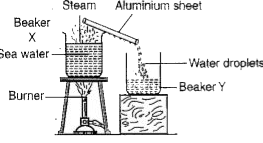Aluminium becomes passive in
Conc. HNO3
H2CrO4
HClO4
All
The correct Answer is:D
N/A
Topper's Solved these Questions
- BOOK - BANSALCHAPTER - P BLOCK ELEMENTSEXERCISE - Exercise 127videos
P BLOCK ELEMENTS
- BOOK - BANSALCHAPTER - P BLOCK ELEMENTSEXERCISE - Exercise 218videos
P BLOCK ELEMENTS
- BOOK - BANSALCHAPTER - P BLOCK ELEMENTSEXERCISE - Solved example9videos
P BLOCK ELEMENTS
- BOOK - BANSALCHAPTER - NITROGEN COMPOUNDSEXERCISE - EXERCISE-4 (Section-4) SECTION -B( JEE Main Previous Question )5videos
NITROGEN COMPOUNDS
- BOOK - BANSALCHAPTER - RADIO ACTIVITYEXERCISE - Exercise-412videos
RADIO ACTIVITY
Similar Questions
Knowledge Check
- Question 1 - Select One
When dipped in conc. HNO3, metals like iron, chromium, nickel, aluminium, base become passive. This is due to
Areduction of metalsBformation of corresponding nitratesCevolution of nitrogen dioxideDformation of layer of metal oxide on the surface of metal - Question 2 - Select One
Metal which become passive with conc. HNO3
ACrBZnCAlDBoth (1) & (3) - Question 3 - Select One or More
Which of the following metals become passive when dropped into conc. HNO3 ?
ACuBFeCCrDAl
Concentrated nitric acid can be stored in aluminium container. Give reason.
View SolutionBoth Be and Al become passive on reaction with conc. nitric acid due to-
View SolutionAssertion (A) : Aluminum is passive towares conc HNO2
Reason (R) : Due to formation of layer of nitrate on aluminiumView SolutionIn the given experiment, some sea water was heated in a beaker. After some time, it was observed that the number of water droplets formed on the aluminium sheet become less and less. Why was this so?

(i) The aluminium sheet had become hotter
(ii) The rate of condensation had decreased
(iii) Beaker X had become hotterView SolutionIron becomes passive by______due to formation of ______.
View Solution

